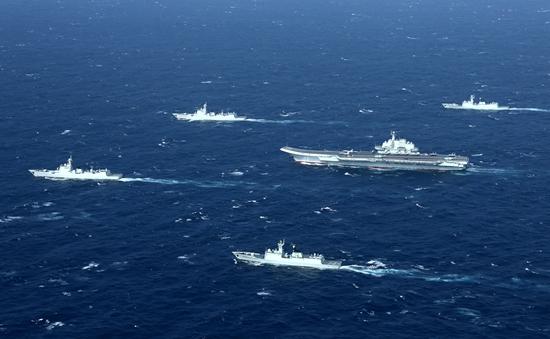Navy training exercises deemed success
|
|
|
Liaoning carrier battle group [File Photo] |
The Chinese Navy has disclosed a series of exercises and missions carried out this month as part of long-term efforts to hone the operational capabilities of its combat forces.
Details of the exercises and sea patrols were provided in a news release ahead of the 68th anniversary of the People’s Liberation Army Navy’s founding, which was on Sunday.
This month, a group of combat ships led by the CNS Xuzhou, a guided missile frigate, carried out combat exercise in the Western Pacific, J-15 carrier-borne fighter jets conducted tactical training above Bohai Bay, various types of naval aircraft made regular patrols over the East China and South China seas, and new-generation submarines sailed silently through deep oceans.
These were a small part of what the Navy has been doing to improve its combat readiness, the news release said, adding that each year every combat vessel and submarine will spend nearly eight months at sea, carrying out patrols, drills and training.
Every day, dozens of aircraft, more than 100 ships and submarines and thousands of Navy personnel are in operation, it added.
According to military observers, the length of time a ship or submarine can perform at sea is a key indicator of its capability, as only those with good equipment, reliable logistics and a well-trained crew can regularly make long-term voyages.
The news release also said the CNS Liaoning, China’s only aircraft carrier, continues to move toward gaining full operational capability. The Liaoning carrier battle group completed a cross-sea, live-fire exercise at the end of last year, marking a big step in the group’s development.
So far, dozens of J-15 pilots and landing signal officers have become qualified to operate aboard the carrier, the Navy said, adding that construction on the first domestically developed carrier is proceeding well.
It also said the nuclear submarine force has made “great progress” in its efforts to enhance fighting ability, without elaborating.
Rear Admiral Du Benyin, deputy political commissar of the PLA Navy’s South Sea Fleet, said long-distance training, international exercises and escort missions have tested the Navy’s front-line commanders and sailors and improved their capabilities.
“During the process, we also found and solved problems such as inefficient logistical support. Though we have made achievements, we are fully aware that more efforts are needed before we become a strong navy,” he said.
Senior Captain Hua Ming, deputy commander of a submarine flotilla with the East Sea Fleet, said that he remembers when the Chinese Navy began escort missions in the Gulf of Aden, some officers from other units told him their ships were unable to fulfill all of their designated tasks.
“But after these years, the Navy now has a great number of advanced destroyers, frigates, submarines and planes. These new weapons enable us to better safeguard our maritime interests and sovereignty,” Hua said.
Talking about his unit, he added, “In the submarine force, we treat each training mission as if it were a real combat scenario.”
Since 2012, the PLA Navy has taken delivery of several new types of ships, which strongly strengthened its defense and strike capacity, the Navy said.
Last year, the Navy commissioned 18 ships, including a Type-052D guided missile destroyer, three Type-054A guided missile frigates and six Type-056 corvettes.
These ships have a total displacement of 150,000 metric tons, roughly half the overall displacement of the British navy.
Since the start of this year, the PLA Navy has commissioned at least five ships: a destroyer, an electronic reconnaissance ship, a training ship and two corvettes, according to information provided by the Navy.
